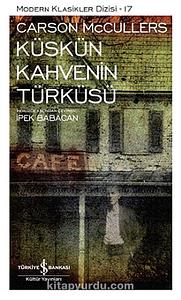You need to sign in or sign up before continuing.
Take a photo of a barcode or cover
Calificación real: 3.75
"Pero a la vida de un hombre no se le ha puesto precio: nos la dan de balde y nos la quitan sin pagárnosla. ¿Qué valor puede tener? Si se pone uno a considerar, hay momentos en que parece que la vida tiene muy poco valor, o que no tiene ninguno. Cuántas veces, después de haber estado uno sudando, y esforzándose, y las cosas no se le arreglan, se le mete a uno en el fondo del alma el sentimiento de que no vale gran cosa."
"La balada del café triste" de Carson McCullers ofrece una mirada agridulce a la vida a través de siete relatos conmovedores. Aunque algunos cuentos pueden parecer más mundanos que otros, como el que lleva el título del libro y "Dilema doméstico", todos comparten una dinámica familiar profunda. Esta colección invita a reflexionar sobre la aceptación de las dificultades y la persistencia en medio de las decepciones. Perfecta para aquellos que buscan una lectura breve y reflexiva sobre las complejidades de la vida y las relaciones familiares.
"Pero a la vida de un hombre no se le ha puesto precio: nos la dan de balde y nos la quitan sin pagárnosla. ¿Qué valor puede tener? Si se pone uno a considerar, hay momentos en que parece que la vida tiene muy poco valor, o que no tiene ninguno. Cuántas veces, después de haber estado uno sudando, y esforzándose, y las cosas no se le arreglan, se le mete a uno en el fondo del alma el sentimiento de que no vale gran cosa."
"La balada del café triste" de Carson McCullers ofrece una mirada agridulce a la vida a través de siete relatos conmovedores. Aunque algunos cuentos pueden parecer más mundanos que otros, como el que lleva el título del libro y "Dilema doméstico", todos comparten una dinámica familiar profunda. Esta colección invita a reflexionar sobre la aceptación de las dificultades y la persistencia en medio de las decepciones. Perfecta para aquellos que buscan una lectura breve y reflexiva sobre las complejidades de la vida y las relaciones familiares.
I've never encountered an Amelia as dissimilar from myself as this Miss Amelia.
1950s Southern Gothic novella about a love triangle between a masculine woman who owns a store, her hunchback cousin whose charisma helps her transition the store to a cafe, and her violent husband of ten days who returns to their small town a decade after he first ran away to challenge his wife to a duel. A bizarre depiction of how love becomes unbalanced if one considers human relationships in terms of monetary transaction (which each of the three do, to an extent), and how that imbalance and conception of a relationship as lover vs. beloved instead of two equal lovers destroys the possibility of human connection. There's a lot going on with how upholding masculinity and rejecting the "feminine" traits of compassion and intimacy also leads to unhealthy relationships and misconstrued conceptions of self. AND the whole story is told by this ballad-like narrator of the town as a single entity complete with narrative refrains and verses. 5/5 stars for the title novella. Some fun quotes:
The heart of a hurt child can shrink so that for ever afterward it is hard and pitted as the seed of a peach. Or again, the heart of such a child may fester and swell until it is a misery to carry within the body, easily chafed and hurt by the most ordinary things.
And the confusing point is this: all useful things have a price, and are bought only with money, as that is the way the world is run. You know without having to reason about it the price of a bale of cotton, or a quart of molasses. But no value has been put on human life; it is given to us free and taken without being paid for. What is it worth? If you look around, at times the value may seem to be little or nothing at all. Often after you have sweated and tried and things are not better for you, there comes a feeling deep down in the soul that you are not worth much.
I'm giving this four stars though because the short stories following the novella were sooo mid. "Wunderkind" and "Madame Zilensky and the King of Finland" were fun and interesting to me, but "The Jockey" was too short to have any meaningful impact on me and I read "The Sojourner" earlier today and had to remind myself twice in the past few hours what it was about. "A Domestic Dilemma" reads like a rejected scene from Mad Men and "A Tree, a Rock, a Cloud" is just about an old man echoing the RuPaulian (can't believe I just typed that) sentiment of "If you can't love yourself... etc." to a little boy and it making the little boy Think A Lot.
The heart of a hurt child can shrink so that for ever afterward it is hard and pitted as the seed of a peach. Or again, the heart of such a child may fester and swell until it is a misery to carry within the body, easily chafed and hurt by the most ordinary things.
And the confusing point is this: all useful things have a price, and are bought only with money, as that is the way the world is run. You know without having to reason about it the price of a bale of cotton, or a quart of molasses. But no value has been put on human life; it is given to us free and taken without being paid for. What is it worth? If you look around, at times the value may seem to be little or nothing at all. Often after you have sweated and tried and things are not better for you, there comes a feeling deep down in the soul that you are not worth much.
I'm giving this four stars though because the short stories following the novella were sooo mid. "Wunderkind" and "Madame Zilensky and the King of Finland" were fun and interesting to me, but "The Jockey" was too short to have any meaningful impact on me and I read "The Sojourner" earlier today and had to remind myself twice in the past few hours what it was about. "A Domestic Dilemma" reads like a rejected scene from Mad Men and "A Tree, a Rock, a Cloud" is just about an old man echoing the RuPaulian (can't believe I just typed that) sentiment of "If you can't love yourself... etc." to a little boy and it making the little boy Think A Lot.
Carson McCullers construye sus historias con una gran belleza con un profunda indagación de la condición humana. Una enorme compasión por sus personajes que nos lleva a conocerlos en todo su patetismo, en su dolor, en su ser en el mundo. Todo hecho con una gran sencillez y belleza.
dark
emotional
funny
reflective
sad
medium-paced
Plot or Character Driven:
Character
Strong character development:
Yes
Loveable characters:
Yes
Diverse cast of characters:
Yes
Flaws of characters a main focus:
Yes
Mais destas edições sem revisão... Chega um ponto em que simplesmente se desiste. Não se pode sequer emitir um juízo de valor geral quando, após passar por uma tradução, a obra original acaba ilegível. Não é tratamento que se dê aos grandes títulos que se fazem publicitar como mais valia da editora.
Eventualmente, mesmo o público menos exigente denotará fatiga em suportar edições deste calibre (ou sem ele). Uma pena quando o catálogo da editora se compõe de alguns excelentes nomes - entre as típicas vedetas que vendem, claro.
Uma editora mais que ser um negócio presta um serviço público. Lamentavelmente, alguns encaram esse serviço de forma mais leviana que outros.
E pronto, esta não é uma review de um livro porque de livro isto tem muito pouco. Não basta colar um par de folhas numa capa plástica para de repente ter o direito de lhe chamar um livro. Devíamos começar a ser mais exigentes enquanto leitores e consumidores (de livros) que, inevitavelmente, somos.
Eventualmente, mesmo o público menos exigente denotará fatiga em suportar edições deste calibre (ou sem ele). Uma pena quando o catálogo da editora se compõe de alguns excelentes nomes - entre as típicas vedetas que vendem, claro.
Uma editora mais que ser um negócio presta um serviço público. Lamentavelmente, alguns encaram esse serviço de forma mais leviana que outros.
E pronto, esta não é uma review de um livro porque de livro isto tem muito pouco. Não basta colar um par de folhas numa capa plástica para de repente ter o direito de lhe chamar um livro. Devíamos começar a ser mais exigentes enquanto leitores e consumidores (de livros) que, inevitavelmente, somos.
A domestic dilemma, Wunderkind y The ballad of the sad café fueron mis cuentos favoritos. Me gustó mucho el libro y cómo escribe y describe Carson McCullers.
beautifully written, specific language of deep South, depressing, nostalgic
Miss Amelia, una mujer que vive el enamoramiento con un hombre diferente y extraño.
Un titulo que sin querer nos revela poco a poco el ambiente que la historia tendrá. Una triste balada que nos muestra todo lo que el amor es capaz de lograr, nos ilusiona, oprime, esclaviza, nos idiotiza, nos anula y nos hace perder el piso.
Un titulo que sin querer nos revela poco a poco el ambiente que la historia tendrá. Una triste balada que nos muestra todo lo que el amor es capaz de lograr, nos ilusiona, oprime, esclaviza, nos idiotiza, nos anula y nos hace perder el piso.


